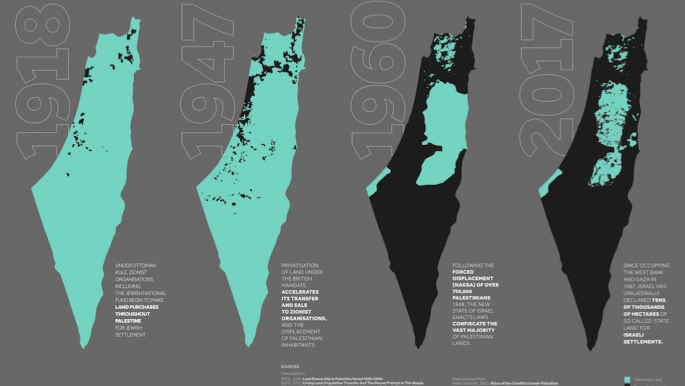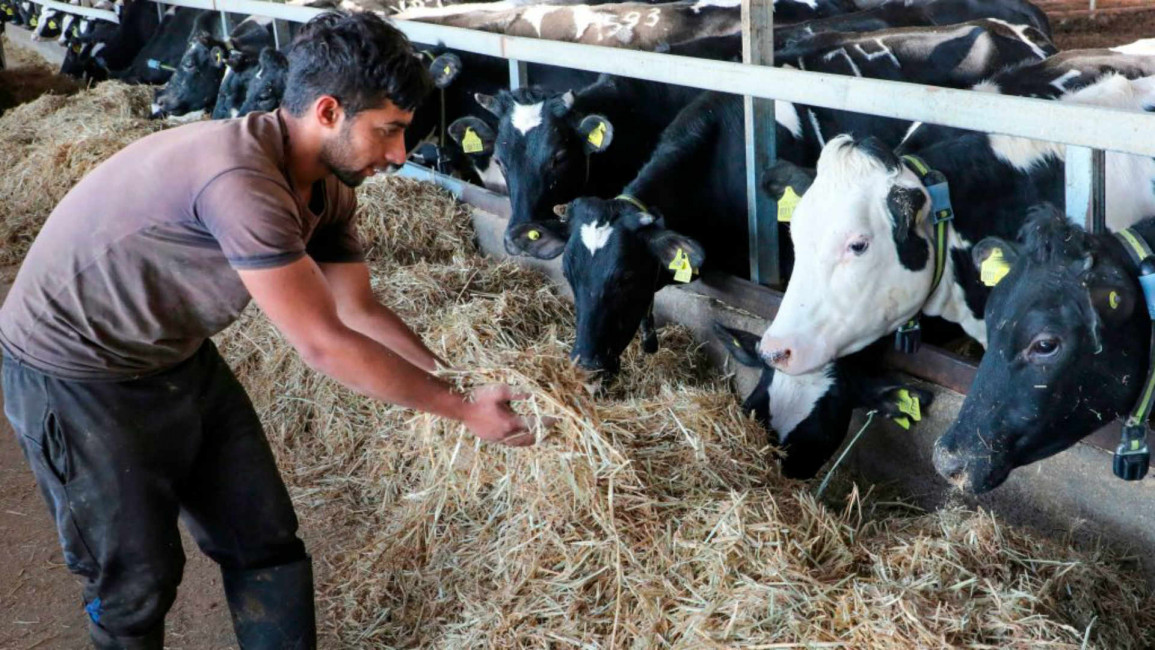
Israel's moneymaking occupation exposed through Palestinian ban on its livestock
Threatening harsh retaliation against the occupied population, Shaked cited new PA prime minister Mohammad Shtayyeh's recent attempts to reduce Palestinian dependence on the Israeli market and economy.
In October, the PA decided to ban imports of Israeli cattle, and seek alternative providers from neighbouring Arab countries such as Jordan. According to Shaked, this measure devastated the livelihood of some 500 Israeli farmers, and put their trade in danger.
Shaked's attack was just one of many similar statements made recently by Israeli officials, pledging to deter the PA at any cost, from attempting to advance economic disengagement from Israel.
A few days earlier, for instance, the Israeli Coordinator of Government Activities in the Territories (COGAT), who runs and administers the occupation, threatened to prevent the PA from importing Israeli agricultural products in the West Bank or exporting Palestinian produce to Israel, unless the PA retracts its ban on Israeli livestock.
Although the Paris Protocol on Economic Relations, signed between the PA and Israel in 1994, gives the PA the full right to diversify Palestinian trade and economic activities, and sign free trade agreements, Israel remains its de facto largest trading partner, by virtue of the occupation's tight control over the Palestinian territories. As a result, over 60 percent of all Palestinian imports come from Israel.
 |
The end goal here is maintaining the profitability of the Israeli occupation |  |
So the frantic and fierce Israeli backlash against the PA's minor attempt to boost economic independence exposes just how deeply profitable the occupation has become for Israel. Israel's flatout denial of the Palestinian right to statehood, freedom and sovereignty have become a moneymaking apparatus, rather than a security dilemma, as their narrative might suggest.
Further evidence of Israel's endeavour to make money from Palestinian misery lies in the backlash against the PA's commitment last March, to end medical transfers of Palestinian patients to Israeli hospitals, instead sending patients to Jordanian, Egyptian and Turkish hospitals for locally unavailble treatment.
The decision came in response to Israel's illegal withholding of more than $138 million of PA tax revenue last February, until the PA stops welfare payments to the families of Palestinians imprisoned or killed by Israel.
Read more: Gaza's fuel crisis is a matter of life-or-death for children in stricken hospitals
Warning of a serious financial crisis, Professor Ze'ev Rothstein, the head of the Israeli Hadassah hospital in Jerusalem, said the PA's decision would cost Israeli hospitals about NIS 100 million in 2019 alone; an indication of how seriously profitable this apparatus has been.
Twitter Post
|
Rothstein appealed to PA president Abbas to resume sending Palestinian patients to Israeli hospitals and "not to involve politics in human life," even though Israel's massive profiteering of treating Palestinian patients at huge financial cost has long been politicised in numerous ways. These include being marketed as a humanitarian service to the occupied population and blackmailing Palestinians to collaborate with Israel, in order to be permitted to receive urgent medical treatment.
Since March, Israel's backlash has only escalated. The Israeli Physicians for Human Rights organisation accused the PA of putting Palestinian lives at risk by halting medical transfers to Israel, while neglecting the serious charges of massive corruption, organ harvesting and experimenting on Palestinian patients in Israeli hospitals, that contributed to the PA's decision.
Furthermore, Jason Greenblatt, Trump's Mideast Peace Envoy who massively defunded Palestinian hospitals in East Jerusalem, has consistently spearheaded a trolling campaign against the decision to force them to resume medical transfers to Israeli hospitals.
Greenblatt's simultaneous relentless efforts to dismantle the UNRWA - which provides vital medical services to Palestinians - shows clearly that the end goal here is maintaining the profitability of the Israeli occupation, rather than exhibiting a shred of care for Palestinians.
Despite the backlash, Shtayyeh's government has been exploring other ways to free the Palestinian economy from Israel's grip. These include seeking alternative oil and gas providers such as Iraq and Jordan, applying for regional free trade agreements, and developing trade mechanisms with Egypt to import Egyptian consumer goods in the West Bank.
 |
Despite the backlash, Shtayyeh's government has been exploring other ways to free the Palestinian economy from Israel's grip |  |
Unfortunately, the main barrier to the Palestinian quest to gradually disengage from Israel, is Israel's control over virtually all border crossings in the occupied West Bank, including the Allenby bridge with Jordan, which gives Israel significant leverage over Palestinian imports and exports. The best way out of this conundrum lies in the besieged Gaza Strip.
Gaza enjoys a sovereign border crossing with Egypt that is not controlled by Israel. This allows it to challenge Israel's tight constraints on Palestinian economic development, and enable the Palestinian government to boost economic independence.
Egypt, however, promises to open the Rafah border crossing to its full potential, only if the PA resumes control of the Gaza Strip.
 |
In recent years we've seen Israel's repeated assault on the reconciliation process, and desperate efforts to block Palestinian unity in any way possible. Netanyahu for example has funnelled off cash to Hamas, as "part of a strategy to keep Palestinians divided", in his own words.
Another Netanyahu strategy has been to make the peace process contingent upon the PA distancing itself from Hamas and Gaza.
For instance, in 2014, when the PA signed a reconciliation agreement with Hamas, the Israeli team withdrew instantly from the negotiation table. "Mr Netanyahu and his government were using Palestinian division as an excuse not to make peace. Now they want to use Palestinian reconciliation as an excuse for the same purpose. This is utterly absurd," Saeb Erekat said at the time.
This grim status quo only emphasises the crucial necessity for Palestinian unity as the main gateway to ending Israel's subjugation of the Palestinian economy, and the holding of Palestinian lives hostage to Israel's profitable occupation.
Follow him on Twitter: @muhammadshehad2
Opinions expressed in this article remain those of the author and do not necessarily represent those of The New Arab.


![Minnesota Tim Walz is working to court Muslim voters. [Getty]](/sites/default/files/styles/image_684x385/public/2169747529.jpeg?h=a5f2f23a&itok=b63Wif2V)




